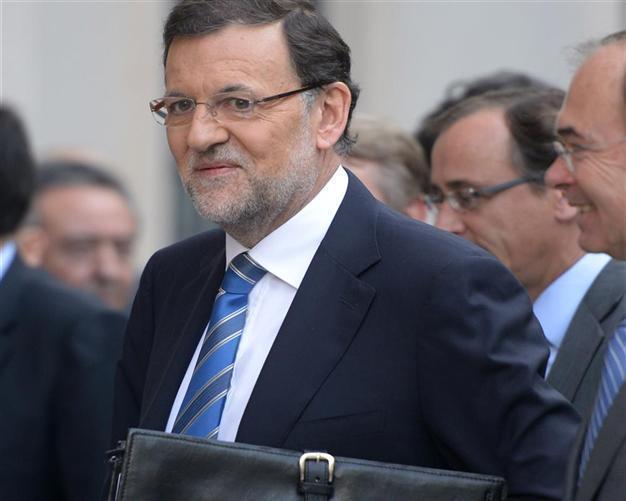Spain PM admits error trusting colleague in scandal
MADRID - Agence France-Presse

Spanish Prime Minister and PP (Popular Party) leader Mariano Rajoy arrives at the Parliament prior to appearing before a special session over allegations that he received illegal payments from his party in Madrid on August 1, 2013. AFP PHOTO/ DOMINIQUE FAGET
Spain's Prime Minister Mariano Rajoy admitted for the first time Thursday he made a mistake in trusting a senior party colleague at the centre of a major financial scandal but denied any wrongdoing and vowed to stay in power.Rajoy, 58, appeared to be in fighting mood in parliament, however, pouring scorn on calls for his resignation as a result of the allegations surrounding his ruling Popular Party's disgraced former treasurer, Luis Barcenas.
"I made a mistake in maintaining confidence in someone who we now know did not deserve it," Rajoy told lawmakers, after having resisted for months to even pronounce Barcenas' name in public.
However, he refused to resign.
"Nothing related to this matter has prevented me, nor will it prevent me from governing," he said. The grey-bearded prime minister said he was appearing before the special session of parliament to "refute the lies, manipulations and malicious insinuations encouraged by certain political leaders" over allegations that he received illegal payments from his party.
Rajoy said the party did pay its officials extra money in addition to their salaries for "work done". The Spanish leader insisted, however, that he had paid taxes and social security contributions on all his income.
The affair threatens to destabilise his government which is battling to strengthen the public finances of the eurozone's fourth-biggest economy, and is anxiously watched by its neighbours.
Rajoy, who took power after leading his party to a landslide election win in November 2011, has denied receiving illegal payments from his conservative Popular Party and refused to step down.
After months of damaging leaks in the press and under pressure from political opponents who threatened a no-confidence vote, Rajoy agreed to explain himself publicly. The corruption affair originated in 2009 as a judicial investigation into alleged kickbacks involving members of the Popular Party.
It exploded in January when leading daily El Pais published copies of account ledgers purportedly showing irregular payments to top party members, including Rajoy who has led the party since 2004.
Those allegations sparked outrage among ordinary Spaniards struggling with spending cuts that Rajoy has imposed during a deep recession.
Barcenas was jailed last month pending an investigation into a separate corruption case, in which he is alleged to have held secret Swiss bank accounts.
On July 14 centre-right daily newspaper El Mundo published friendly text messages purportedly sent by Rajoy to Barcenas from May 2011 to March 2013, some two months after the scandal erupted.
The latest revelations sparked a series of questions in parliament and the opposition Socialists have called for the prime minister to step down.
The noose appeared to tighten around the premier when Barcenas testified in court that he handed cash to Rajoy and the party's deputy leader Maria Dolores de Cospedal.
Conservative newspaper El Mundo calculated that Barcenas paid a total of 343,700 euros ($456,260) to Rajoy over two decades.
Cospedal has been summoned to testify as a witness on August 14 by the judge investigating the scandal, Pablo Ruz. She has rejected Barcenas' claims as lies.
In a poll published on July 21 in El Mundo newspaper, nearly nine out of 10 Spaniards questioned said they felt Rajoy should explain himself in parliament.
Two-thirds believed Rajoy had received payments, with one in five believing the contrary.
Political analysts say it is unlikely Rajoy will step down however. Such resignations have been very rare in Spanish politics since the restoration of democracy in 1978.
The Socialists on Wednesday reiterated their call for Rajoy to go.
"Our aim is two-fold: that the prime minister tell the truth and that he quit his post," its deputy leader Elena Valenciano told reporters.
"If we don't get that tomorrow, we will keep insisting and fighting for it."
















